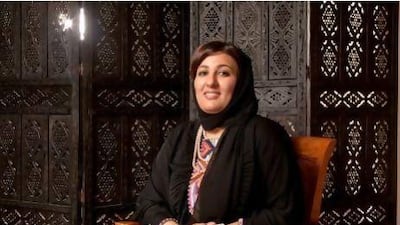On an evening in late June, at sunset, a helicopter will fly over London and drop more than 200 poems - each by a different author, each author from a different country - on to the South Bank of the River Thames, and the world's biggest gathering of international poets will begin.
Poetry Parnassus was conceived by Simon Armitage as a literary sister event to the Olympic Games, and poets from the Gulf will feature prominently in the talks, workshops, celebrations and readings that will make up the event. These include Nujoom Al Ghanem, chosen to represent the UAE, who says she is "proud to be part of this event and really excited to present my country and culture".
"We have got the most amazing poets from the Gulf," says Anna Selby, who had the Herculean task of researching and picking a poet from every Olympic country. She was introduced to the region's poetry by an anthology called Gathering the Tide, and says "I fell in love with almost all the poems."
"It has a magical quality," she says of poetry from the Arab world. "It's almost like all the poets have this photographic memory and can just draw up images and experiences from when they were a child or from what they saw yesterday, so you're right there with them."
Writers from other parts of the world who have been confirmed include North Korean Jang Jin Seong, a former court poet to Kim Jong-il who is in self-imposed exile in South Korea; Didier Awadi, a Senegalese breakdancer, rapper and activist; and poet and tattoo artist Kosal Khiev, from Cambodia, who was born in a Thai refugee camp, fled as a child to the USA, and was arrested for attempted murder at the age of 16. He discovered spoken-word poetry during his 14-year sentence.
Here are the choices from countries closer to home:
UAE: Nujoom Al Ghanem
Well-known as both a filmmaker and a poet, Al Ghanem has a lot of work to juggle, but for her, poetry is never a chore. "It could be considered as a refuge," she says. "It's my nook that I run to when all ways of expressions fail." Born and raised in Dubai, she began her career as a journalist before studying TV and film in the US and Australia, and is currently working on a feature film about a female Emirati artist.
Selby is a fan. "When you're reading hundreds and hundreds of poems, suddenly you'll come across a poet who will just make you sit upright all of a sudden, and that's what her work did for me. It's absolutely beautiful, and it just captivates you."
Kuwait: Saadia Mufarreh
An Arabic-language graduate of Kuwait University, Mufarreh has written four volumes of poetry and is also currently Arts Editor of the newspaper Al Qabas in Kuwait. "She has the most fantastic titles for her collections," says Selby. They include, When You're Gone, I Saddle My Suspicion's Horses and He Was the Last of the Dreamers.
Oman: Zahir Al Ghafri
Although his roots are firmly in Oman, where he was born, Al Ghafri has travelled the world, going to school in Cairo, studying in Baghdad and Rabat, and working in Damascus, Algeria, Paris, London and Sweden. As well as releasing several volumes of prose and avant-garde poetry, he founded the Omani magazine Nizwa, and is a consulting editor for the London-based magazine Banipal.
Saudi Arabia: Ashjan Hendi
A poet and literary critic from Jeddah, Hendi has a PhD from the School of Oriental and African Studies in London. Her poetry has been translated into French, German, Spanish and Turkish. She currently works as an assistant professor in the Arabic department at King Abdul-Aziz University.
Qatar: Dhabiya Khamis
Khamis is an author, translator and diplomat with more than 45 published works, including 18 poetry collections and four works of fiction. As well as studying in London and Cairo, she has been a diplomat with the Arab League and has served as UAE's Ambassador to India.
Bahrain: Qassim Haddad
The co-founder and chairman of the Bahraini Writers' Union, Haddad is also a prolific writer of poetry and prose, despite being largely self-educated. He controversially reworked the Arabic classic Layla and Majnun in 2007.
Follow
Arts & Life on Twitter
to keep up with all the latest news and events

